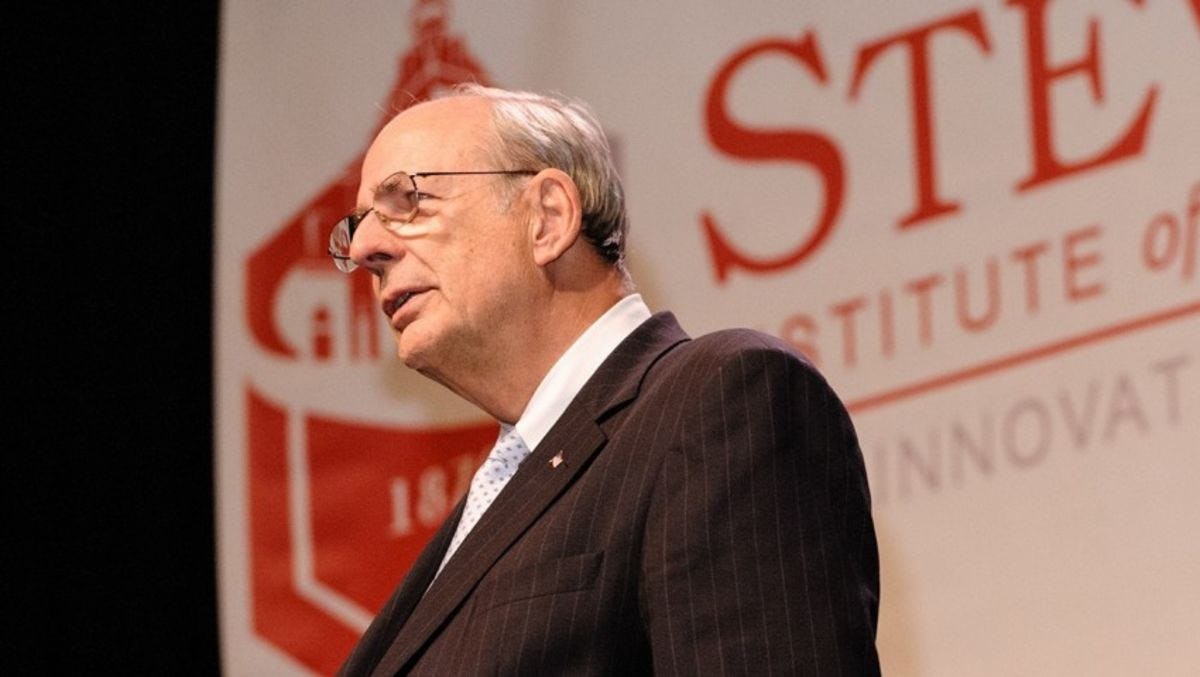Former CEO of Lockheed Martin Kicks Off Stevens’ President’s Distinguished Lecture Series
25 OCT 2012 CAMPUS & COMMUNITY
A full house of almost 400 students, faculty, staff and guests packed Stevens Institute of Technology’s DeBaun Auditorium on Oct. 24, 2012 to hear retired defense and aerospace industry executive Norman Augustine’s insights on role of technological innovation in shaping America in the 21st century.
Augustine, former Lockheed Martin Chairman and CEO and a renowned leader in industry, government and academia, was the inaugural speaker in Stevens’ President’s Distinguished Lecture Series. Launched this year by Stevens President Nariman Farvardin, the series offers the Stevens community unprecedented access to influential scientists, technologists and policymakers, who engage in academic and policy discussions focused on important topics in science and technology.
“We live in a rapidly changing world which has been forever altered by the impact of science and technology,” said Farvardin. “This series features the world’s foremost thought leaders discussing the rate of technological innovation and the change it brings to our lives and our society."
“Who better than Norman Augustine to kick off this series?” added Farvardin.
In the inaugural lecture, entitled “Emerging Technology and Its Broad Implications,” Augustine – who has advised sitting U.S. Presidents on science, technology and defense issues – described why technological advancement has created an altogether new world in which the impact we have on one another is no longer diminished by distance.
“Globalization was brought about by two scientific advances – jet aircrafts which enable us to move people and things around the world almost at the speed of sound, and information technology which enables us to move knowledge around the world almost instantly. In this global village, change comes very quickly,” he said.
Augustine said technology and innovation are in many instances forces of positive transformation. However, the nation needs to be ready to adapt to the profound implications of scientific progress.
Employment – a major concern for all American citizens, especially in an election year – is one critical area of society that is impacted by technological advancement.
“Today Americans compete for jobs with highly-motivated and highly-educated people from all over the planet,” Augustine said.
He described call center representatives in India who answer service calls from Oklahoma; physicians in Australia who read the medical scans taken in New York City hospitals; six Chinese chemists who cost the same as one American chemist.
“As manufacturing jobs and factories disappear in America, we have a full-spectrum problem,” Augustine said. “As they move abroad, so do related industries and businesses.”
Augustine said the answer to the jobs question is innovation – taking new knowledge from world-class research, creating new products and services, and taking them to market through entrepreneurship. He cited numerous studies which highlighted the connection between science and technology innovation, jobs and economic growth.
“America needs to better manage science, technology and engineering for the public good,” he said. “Scientists and engineers are only five percent of the workforce, but they create jobs for a much greater proportion of the population.”
Finally, Augustine spoke in detail about a key ingredient for America to better support innovation – science, technology, engineering and mathematics (STEM) education – and the challenges the system faces today at every level.
He called America’s research universities its “greatest economic advantage,” but said they are threatened by public funding cuts and rising tuition. The biggest problem, he said, is that America produces the lowest percentage of STEM graduates, compared to other degrees, than almost every other developed country.
“The lack of engineering education is a severe handicap for the United States in the global economy,” Augustine said.
Augustine also called for reforms of the K-12 education system to better prepare the future workforce in science and math, where U.S. students also lag in proficiency scores.
“Science, technology and engineering are the engines which propel our economy,” he closed.
Farvardin said Augustine – who was a 16-year member of the President’s Council of Advisors on Science and Technology, has been a regent or trustee at four universities, and has been a board member of four global corporations – was the ideal speaker to discuss these crucial subjects.
“Mr. Augustine’s accomplishments are vast and profound, and he has helped to shape some of the most important technology policies in this country,” said Farvardin.
Stevens – one of 29 universities to present Augustine with an honorary degree – was also the ideal venue for Augustine’s discussion. Founded in 1870 and nicknamed “The Innovation University™,” Stevens has a tremendously rich history as a leader of scientific and technological innovation in naval engineering, mechanical engineering, systems engineering and other fields. Today, the university continues to develop, implement and leverage technology to confront critical global issues, including the energy crisis, healthcare reform, cybersecurity and more.
The next ten years promises to increase the university’s impact, as Stevens recently launched a strategic plan which charts a course to expand in size and focus strategically on education and research domains that tackle complex, societal challenges.
For more information about the President’s Distinguished Lecture Series, please visit www.stevens.edu/lecture.
